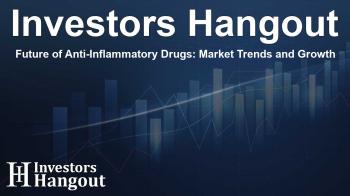Future of Anti-Inflammatory Drugs: Market Trends and Growth

The Expanding Market of Anti-Inflammatory Drugs
Recent assessments indicate that the global anti-inflammatory drugs market, valued at approximately USD 122.32 billion, is poised for substantial growth, potentially reaching USD 274.79 billion in the coming decade. This remarkable uptick reflects a CAGR of 8.43%, underscoring a robust demand fueled by innovations in drug development and increasing accessibility.
Understanding Anti-Inflammatory Drugs
Anti-inflammatory drugs play a crucial role in managing chronic inflammatory conditions by targeting the body's inflammatory response, thereby alleviating symptoms like pain, swelling, and fever. These medications are particularly vital in treating a variety of health issues, including autoimmune diseases and conditions associated with pain, fever, and swelling from injuries or surgeries.
Key Growth Factors Driving the Market
One of the primary catalysts for the growth of the anti-inflammatory drugs market is the rising incidence of autoimmune diseases. The combination of lifestyle changes and increasing obesity rates correlates with a surge in conditions such as arthritis and inflammatory bowel diseases (IBD). As the aging population expands, so does the need for these essential medications. Additionally, advancements in biosimilars and ongoing research and development efforts are greatly enhancing market potential.
Major Trends Influencing the Market
Recent market trends show increased collaboration and funding aimed at boosting the efficacy and accessibility of anti-inflammatory therapies. Innovative partnerships, such as those between pharmaceutical companies, are paving the way for new treatment modalities and medications that promise better patient outcomes.
Regional Market Performance and Insights
In 2024, North America maintained a significant share of the anti-inflammatory drugs market, driven by a high prevalence of chronic inflammatory diseases. The region's healthcare professionals are increasingly adopting advanced therapeutics and biologic agents, further supporting innovation. This trend is bolstered by significant investments in research and development, particularly in the United States, which is witnessing remarkable advancements in biologic therapies.
Insights into the U.S. Market
- High Prevalence of Autoimmune Conditions: The U.S. harbors a large number of individuals affected by chronic diseases such as arthritis and asthma, driving steady demand for anti-inflammatory drugs.
- Aging Population: An expanding elderly demographic is particularly vulnerable to inflammatory disorders, underscoring the essentiality of these medications.
- Investment in Biologics: The U.S. is at the forefront of biopharmaceutical innovation, focusing on targeted therapies that improve treatment effectiveness for diseases like rheumatoid arthritis.
Market Challenges and Future Outlook
While the anti-inflammatory drugs market showcases promising growth, it is not without its challenges. Safety concerns surrounding certain drug classes, particularly NSAIDs and corticosteroids, pose significant hurdles. Side effects such as kidney damage and high blood pressure can limit usage, necessitating further research to ensure patient safety. Additionally, increasing competition from generic drugs and regulatory obstacles may impact market dynamics.
Emerging Treatments and Recent Developments
Innovative therapies continue to emerge in the anti-inflammatory landscape. Recent approvals by regulatory bodies like the USFDA for various new formulations highlight the ongoing evolution in this sector. Companies are actively working on novel treatments that target specific inflammatory pathways, demonstrating a clear trend towards personalized medicine.
Frequently Asked Questions
What is the current value of the anti-inflammatory drugs market?
The global anti-inflammatory drugs market is currently valued at approximately USD 122.32 billion and is projected to reach around USD 274.79 billion by 2034.
What are the primary drivers of market growth?
The market's growth is primarily driven by the increasing incidence of autoimmune diseases, advancements in biosimilars, and a growing geriatric population.
Which regions are experiencing the most significant growth?
Asia Pacific is expected to witness the fastest growth in the anti-inflammatory drugs market during the forecast period due to rising chronic conditions and enhanced healthcare access.
What treatment types dominate the market?
Arthritis and inflammatory bowel disease (IBD) are two of the primary treatment types driving demand for anti-inflammatory drugs.
What challenges does the market face?
Safety concerns regarding the side effects of various drug classes and competition from generics represent significant challenges in the anti-inflammatory drugs market.
About The Author
Contact Thomas Cooper privately here. Or send an email with ATTN: Thomas Cooper as the subject to contact@investorshangout.com.
About Investors Hangout
Investors Hangout is a leading online stock forum for financial discussion and learning, offering a wide range of free tools and resources. It draws in traders of all levels, who exchange market knowledge, investigate trading tactics, and keep an eye on industry developments in real time. Featuring financial articles, stock message boards, quotes, charts, company profiles, and live news updates. Through cooperative learning and a wealth of informational resources, it helps users from novices creating their first portfolios to experts honing their techniques. Join Investors Hangout today: https://investorshangout.com/
The content of this article is based on factual, publicly available information and does not represent legal, financial, or investment advice. Investors Hangout does not offer financial advice, and the author is not a licensed financial advisor. Consult a qualified advisor before making any financial or investment decisions based on this article. This article should not be considered advice to purchase, sell, or hold any securities or other investments. If any of the material provided here is inaccurate, please contact us for corrections.

